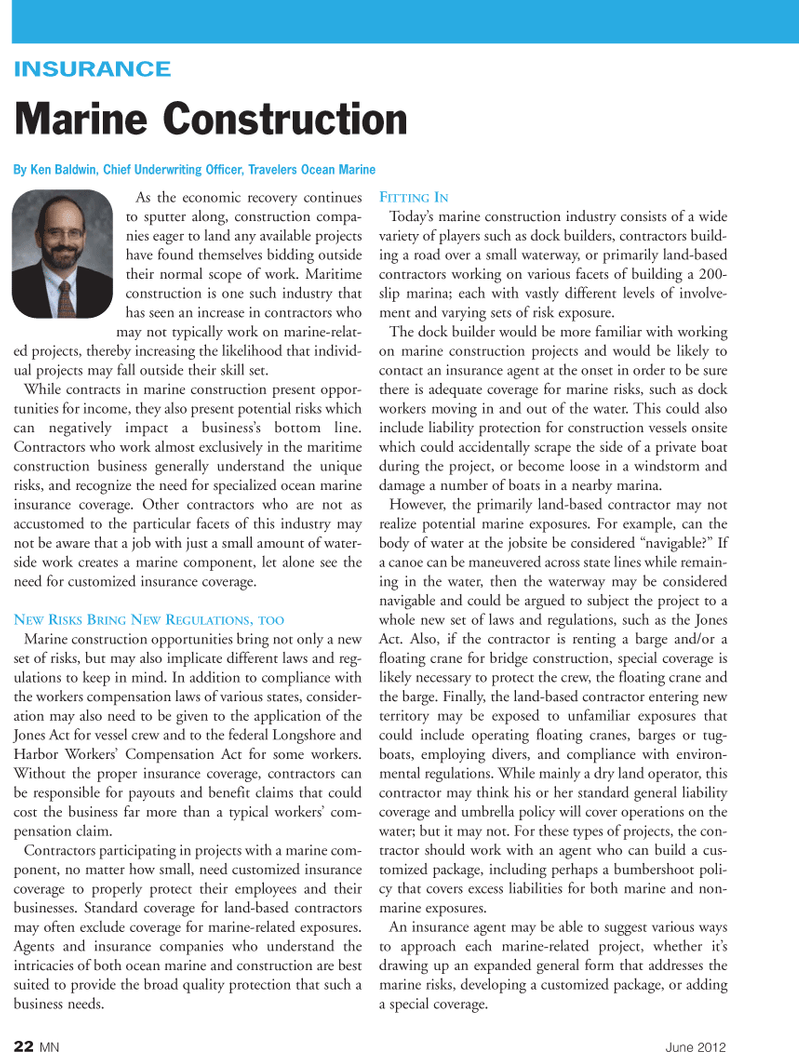
Page 22: of Marine News Magazine (June 2012)
Dredging & Marine Construction
Read this page in Pdf, Flash or Html5 edition of June 2012 Marine News Magazine
22MNJune 2012 As the economic recovery continues to sputter along, construction compa- nies eager to land any available projects have found themselves bidding outside their normal scope of work. Maritime construction is one such industry that has seen an increase in contractors who may not typically work on marine-relat- ed projects, thereby increasing the likelihood that individ- ual projects may fall outside their skill set. While contracts in marine construction present oppor- tunities for income, they also present potential risks which can negatively impact a businesss bottom line. Contractors who work almost exclusively in the maritime construction business generally understand the unique risks, and recognize the need for specialized ocean marine insurance coverage. Other contractors who are not as accustomed to the particular facets of this industry may not be aware that a job with just a small amount of water- side work creates a marine component, let alone see the need for customized insurance coverage. NEWRISKSBRINGNEWREGULATIONS , TOO Marine construction opportunities bring not only a new set of risks, but may also implicate different laws and reg- ulations to keep in mind. In addition to compliance with the workers compensation laws of various states, consider- ation may also need to be given to the application of the Jones Act for vessel crew and to the federal Longshore and Harbor Workers Compensation Act for some workers. Without the proper insurance coverage, contractors can be responsible for payouts and benefit claims that could cost the business far more than a typical workers com- pensation claim.Contractors participating in projects with a marine com- ponent, no matter how small, need customized insurance coverage to properly protect their employees and their businesses. Standard coverage for land-based contractors may often exclude coverage for marine-related exposures. Agents and insurance companies who understand theintricacies of both ocean marine and construction are best suited to provide the broad quality protection that such a business needs.FITTING INTodays marine construction industry consists of a wide variety of players such as dock builders, contractors build- ing a road over a small waterway, or primarily land-based contractors working on various facets of building a 200- slip marina; each with vastly different levels of involve- ment and varying sets of risk exposure. The dock builder would be more familiar with working on marine construction projects and would be likely to contact an insurance agent at the onset in order to be sure there is adequate coverage for marine risks, such as dock workers moving in and out of the water. This could also include liability protection for construction vessels onsite which could accidentally scrape the side of a private boat during the project, or become loose in a windstorm and damage a number of boats in a nearby marina. However, the primarily land-based contractor may not realize potential marine exposures. For example, can the body of water at the jobsite be considered navigable?? If a canoe can be maneuvered across state lines while remain- ing in the water, then the waterway may be considered navigable and could be argued to subject the project to a whole new set of laws and regulations, such as the Jones Act. Also, if the contractor is renting a barge and/or a floating crane for bridge construction, special coverage is likely necessary to protect the crew, the floating crane and the barge. Finally, the land-based contractor entering new territory may be exposed to unfamiliar exposures that could include operating floating cranes, barges or tug-boats, employing divers, and compliance with environ- mental regulations. While mainly a dry land operator, this contractor may think his or her standard general liability coverage and umbrella policy will cover operations on the water; but it may not. For these types of projects, the con- tractor should work with an agent who can build a cus- tomized package, including perhaps a bumbershoot poli- cy that covers excess liabilities for both marine and non- marine exposures. An insurance agent may be able to suggest various ways to approach each marine-related project, whether its drawing up an expanded general form that addresses the marine risks, developing a customized package, or adding a special coverage. INSURANCEBy Ken Baldwin, Chief Underwriting Officer, Travelers Ocean Marine Marine Construction

 21
21

 23
23
